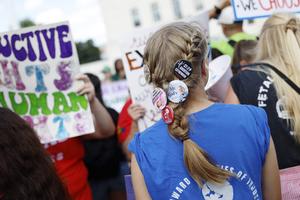Pro-Life Pregnancy Centers Help Women — Why Are They Being Targeted?
Pro-life pregnancy centers are being vandalized nationwide, and now Sen. Elizabeth Warren has introduced legislation in the Senate attacking their valuable work.

After the Supreme Court overturned Roe v. Wade, permitting states to move ahead with laws restricting abortion, one area of apparent common ground between pro-life and pro-abortion advocates could be providing resources and options to women in crisis pregnancies including material aid, housing and career counseling. However, these efforts by pro-life pregnancy centers have been met with vandalism by extreme abortion activists and now legislation accusing the centers of misleading women.
Sen. Elizabeth Warren, D-Mass., joined by 14 of her colleagues in the Senate, introduced a bill asserting that “crisis pregnancy centers (CPCs) are anti-abortion organizations that present themselves as comprehensive reproductive health care providers with the intent of discouraging pregnant people from having abortions.” The bill directs the Federal Trade Commission to “promulgate rules to prohibit a person from advertising with the use of misleading statements related to the provision of abortion services” with a steep $100,000 fine or “50 percent of the revenues earned by the ultimate parent entity” of the center if they violate the prohibition on “misleading statements” which are not defined in the bill.
Warren does not provide evidence for her claim that pro-life pregnancy centers “routinely engage in a variety of deceptive tactics, including making false claims about reproductive health care and providers, disseminating inaccurate, misleading, and stigmatizing information about the risks of abortion and contraception, and using illegitimate or false citations to imply that deceptive claims are supported by legitimate medical sources.”
A report by the pro-life Charlotte Lozier Institute found that in 2019 there were about 2,700 crisis pregnancy centers and “68,832 workers serve pregnancy centers, including nearly 3,800 licensed medical staff (25% of paid staff).” The report also found that these centers provided “more than 486,000 free ultrasounds,” 160,200 STI/STD tests, and “more than 291,000 clients attended parenting and prenatal education programs.” Some of these services are not widely covered by abortion clinics like Planned Parenthood, which Sen. Warren says women depend on for “basic medical care.” Planned Parenthood provided only 8,626 instances of prenatal services from 2019-2020, according to their annual report, and does not list the provision of any ultrasounds.
Former Planned Parenthood president Leana Wen tweeted an article in 2019 about a Tennessee pro-life crisis pregnancy ‘Options’ saying, “While I have deep concerns about ‘crisis pregnancy centers’ that deliberately mislead patients, this article exemplifies the kind of common ground that all who support women, children, and families should agree on.” The center offers counseling, referrals for housing, medical care and adoption services as well as post-abortion healing. It also provides childcare necessities for mother and child.
While Warren is expressing concern that most pro-life pregnancy centers “do not employ licensed medical personnel,” she is also urging the Biden administration to “expand access to medication abortion,” where a woman would undergo an abortion at home without an in-person consultation with any licensed medical personnel. She recently praised the U.S. Food and Drug Administration’s decision to permanently lift in-person dispensing requirements for the abortion pill in December.
In her bill, Warren wrote that pro-life centers “target under-resourced neighborhoods and communities of color, including Black, Latino, Indigenous, Asian American, Pacific Islander, and immigrant communities, by locating their facilities near social services centers and comprehensive reproductive health care providers.” Warren does not address how pro-life groups are targeting under-resourced neighborhoods by being located near “comprehensive reproductive health care providers,” but reproductive health care providers are not also targeting these neighborhoods by being located there.
This is not the first time lawmakers have targeted pro-life pregnancy centers. A 2015 law tried to require that pro-life pregnancy centers in California “disseminate to clients” a message promoting public programs with “free or low-cost access” to abortion and contraceptive services. The law resulted in a lawsuit and ultimately a 5-4 Supreme Court decision in 2018 that determined it violated the First Amendment.
In May, Warren tweeted that “when someone’s deciding whether to get abortion, they should be able to consult with anyone they want — a doctor, a nurse, a friend, a parent, a partner. But you know who shouldn’t be able to put themselves in the middle of that decision? Politicians and government agents.” Perhaps she should apply that advice to women who wish to hear about resources available at pro-life pregnancy centers.

















